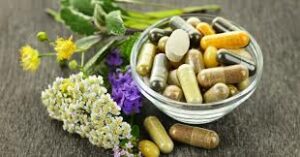Menopause, a natural phase in every woman’s life, brings with it a unique set of challenges and changes. While this transition is a normal part of aging, the symptoms associated with menopause can be uncomfortable and, at times, disruptive. Fortunately, there are numerous over-the-counter meds for menopause available that can help alleviate the symptoms, providing relief and improving quality of life. In this blog, we’ll explore various OTC options for managing menopause symptoms, offering insights and tips to help you navigate this stage with greater ease and comfort.
Contents
Over-the-Counter Meds For Menopause Relief
 Over-the-counter meds for menopause can be helpful. It’s important to remember that while these options do not require a prescription, it’s still advisable to consult with a healthcare provider before starting any new supplement, especially if you have existing health conditions or are taking other medications. Here are some commonly used OTC meds for menopause relief:
Over-the-counter meds for menopause can be helpful. It’s important to remember that while these options do not require a prescription, it’s still advisable to consult with a healthcare provider before starting any new supplement, especially if you have existing health conditions or are taking other medications. Here are some commonly used OTC meds for menopause relief:
Phytoestrogens (Isoflavones)
Phytoestrogens, particularly isoflavones, are compounds that naturally occur in certain plants and exhibit estrogen-like activity. They are found in high concentrations in soybeans and soy products. For women undergoing menopause, isoflavones are thought to help balance hormone levels, potentially reducing symptoms like hot flashes and night sweats. Isoflavone supplements are often taken in the form of capsules or tablets, and they may also support bone health.
Black Cohosh
Black cohosh is a herb native to North America and has been traditionally used to ease menopausal symptoms. It is most commonly used for hot flashes, night sweats, and mood disturbances. The exact mechanism by which black cohosh works is not fully understood, but it’s believed to have an effect on serotonin levels and possibly estrogenic activity. Clinical studies on black cohosh have shown mixed results, and its long-term safety is still being evaluated. It’s generally available in capsules, teas, or extracts.
St. John’s Wort
This is a plant that’s been used for centuries for mental health conditions, particularly mild to moderate depression. In the context of menopause, it’s believed to help with mood swings and depressive symptoms that can accompany the transition. This herb works by affecting neurotransmitters in the brain, such as serotonin, which can influence mood. However, it’s crucial to note that St. John’s Wort can interact with several medications, including antidepressants and birth control pills, so professional consultation is essential.
Red Clover
Red clover is another plant that contains isoflavones and is often used as a natural remedy for menopausal symptoms. Similar to soy isoflavones, these compounds in red clover might help reduce hot flashes and improve bone density. However, like with other phytoestrogenic herbs, the scientific evidence regarding its effectiveness is mixed. Red clover is available as capsules, teas, or tinctures.
Dong Quai
Known in traditional Chinese medicine as “female ginseng,” Dong Quai is a herb used for various female health issues, including menopause symptoms. It is often touted for its ability to balance estrogen levels and improve overall well-being during menopause. However, scientific support for Dong Quai’s effectiveness in treating menopausal symptoms is limited. And it may have estrogenic properties, making it unsuitable for women with certain health conditions.
Evening Primrose Oil
Extracted from the seeds of the evening primrose plant, this oil is commonly used for various health issues, including menopausal symptoms such as hot flashes and breast tenderness. It’s believed to influence hormonal balance and inflammatory responses. However, scientific evidence supporting its effectiveness for menopausal symptoms is not robust. Evening primrose oil is generally consumed in capsule form.
Vitamin E
Vitamin E is an antioxidant that has been explored for its potential in alleviating menopausal symptoms, particularly hot flashes. Some studies suggest that vitamin E supplements can provide a modest reduction in the severity and frequency of hot flashes. Beyond its potential benefits for menopausal symptoms, vitamin E plays a critical role in immune function and skin health. It’s available in capsule form or can be increased in the diet through foods like nuts, seeds, and green leafy vegetables.
Ginseng
Particularly Panax ginseng, is often recommended for its general health benefits, including immune support and enhanced energy levels. For menopausal women, ginseng might offer benefits in improving mood and enhancing sleep quality. Some studies indicate that it can help in reducing the severity of hot flashes and other menopausal symptoms. However, the evidence is not conclusive, and further research is needed. Ginseng is available in various forms, including capsules, teas, and extracts.
Omega-3 Fatty Acids
These are essential fats that play a crucial role in brain health and inflammation reduction. Found in high amounts of fish oil, flaxseed, and walnuts, omega-3 supplements have been suggested to help with depressive symptoms that can accompany menopause. They might also have a beneficial impact on overall heart health. This is particularly important as the risk of heart disease increases after menopause. Omega-3 supplements are widely available in capsule and liquid forms.
Calcium and Vitamin D
 Both are essential for maintaining bone health, a significant concern for postmenopausal women who are at an increased risk for osteoporosis due to the decline in estrogen levels. Calcium supports the structure of bones and teeth, while vitamin D enhances calcium absorption and bone growth. Supplements can help in meeting the recommended daily intake, especially in individuals with dietary restrictions or limited sun exposure. It’s important to balance the intake of these nutrients to maintain bone health and prevent osteoporosis.
Both are essential for maintaining bone health, a significant concern for postmenopausal women who are at an increased risk for osteoporosis due to the decline in estrogen levels. Calcium supports the structure of bones and teeth, while vitamin D enhances calcium absorption and bone growth. Supplements can help in meeting the recommended daily intake, especially in individuals with dietary restrictions or limited sun exposure. It’s important to balance the intake of these nutrients to maintain bone health and prevent osteoporosis.
Magnesium
Known for its relaxing properties, magnesium plays a role in over 300 enzymatic reactions in the body, including those involved in the regulation of stress and sleep. It can be beneficial for menopausal women experiencing insomnia or mood swings. Magnesium is found in foods like nuts, seeds, whole grains, and green leafy vegetables, and is also available as an oral supplement. It’s often recommended for its calming effects on the nervous system and may help improve sleep quality.
Over-the-counter lubricants and Moisturizers
Vaginal dryness is a common menopause symptom due to decreased estrogen levels, which can lead to discomfort during intercourse. Over-the-counter vaginal lubricants and moisturizers can provide relief. Lubricants are used to facilitate sexual activity, while moisturizers provide longer-term relief from dryness and can be used regularly. These products come in various forms, including gels, creams, and suppositories, and can significantly improve comfort and sexual health during and after menopause.
It’s important to approach these over-the-counter meds for menopause with caution. Unlike prescription medications, the FDA does not regulate dietary supplements for effectiveness or safety before they hit the market. Ensure you purchase supplements from reputable sources and consult a healthcare provider to understand potential interactions with other medications and the appropriate dosage for your needs.
Lifestyle Changes To Help In Menopause
 Making lifestyle changes can significantly help in managing menopause symptoms. These adjustments can improve overall health and well-being during this transition. Here are some key lifestyle changes that can be beneficial:
Making lifestyle changes can significantly help in managing menopause symptoms. These adjustments can improve overall health and well-being during this transition. Here are some key lifestyle changes that can be beneficial:
- Regular Physical Activity
Exercise is crucial during menopause. It helps in managing weight, reducing stress, improving mood, and enhancing sleep quality. Weight-bearing exercises, like walking and strength training, are particularly important for bone health. Aim for at least 150 minutes of moderate aerobic activity or 75 minutes of vigorous aerobic activity per week, along with muscle-strengthening activities on two or more days a week.
- Healthy Diet
Eating a balanced diet is important. Focus on a variety of fruits, vegetables, whole grains, lean proteins, and healthy fats. Foods rich in calcium and vitamin D are essential for bone health. Limiting spicy foods, caffeine, and alcohol might help reduce hot flashes.
- Stay Hydrated
Decreased estrogen levels can lead to dryness, notably affecting the skin. Drinking plenty of water can help counteract this dryness. Aim for 8-12 glasses of water daily.
- Improve Sleep Hygiene
Many women experience sleep problems during menopause. Establishing a regular sleep schedule, creating a comfortable sleep environment, and avoiding stimulants like caffeine and electronic devices before bedtime can help improve sleep quality.
- Stop Smoking
Smoking can increase the severity of hot flashes and bring on earlier menopause. Quitting smoking is beneficial for overall health and can reduce menopause symptoms.
- Moderate Alcohol Intake
Excessive alcohol can trigger hot flashes and contribute to weight gain. Limiting alcohol consumption can help in managing these symptoms.
- Cooling Techniques for Hot Flashes
Dress in layers, use a fan, keep a cold water bottle handy, and choose breathable fabrics like cotton. These small adjustments can be very helpful in managing hot flashes.
These lifestyle changes, combined with a positive attitude towards menopause as a natural and manageable phase of life, can significantly improve the menopause experience. Women need to pay attention to their bodies and seek professional advice when needed.
Conclusion
In conclusion, navigating the journey of over-the-counter meds for menopause can be made smoother with a combination of over-the-counter medications, and crucial lifestyle changes. While each woman’s experience with menopause is unique, incorporating regular exercise, a balanced diet, proper hydration, stress management, and good sleep hygiene can significantly alleviate many of the common symptoms.
Embracing these strategies with a positive mindset and seeking support from the community and healthcare professionals can make a substantial difference in experiencing a more comfortable and fulfilling menopausal transition. If you are facing menopause related issues, menopause treatment at HerMantra can help. Book your free trial online menopause treatment session now.


